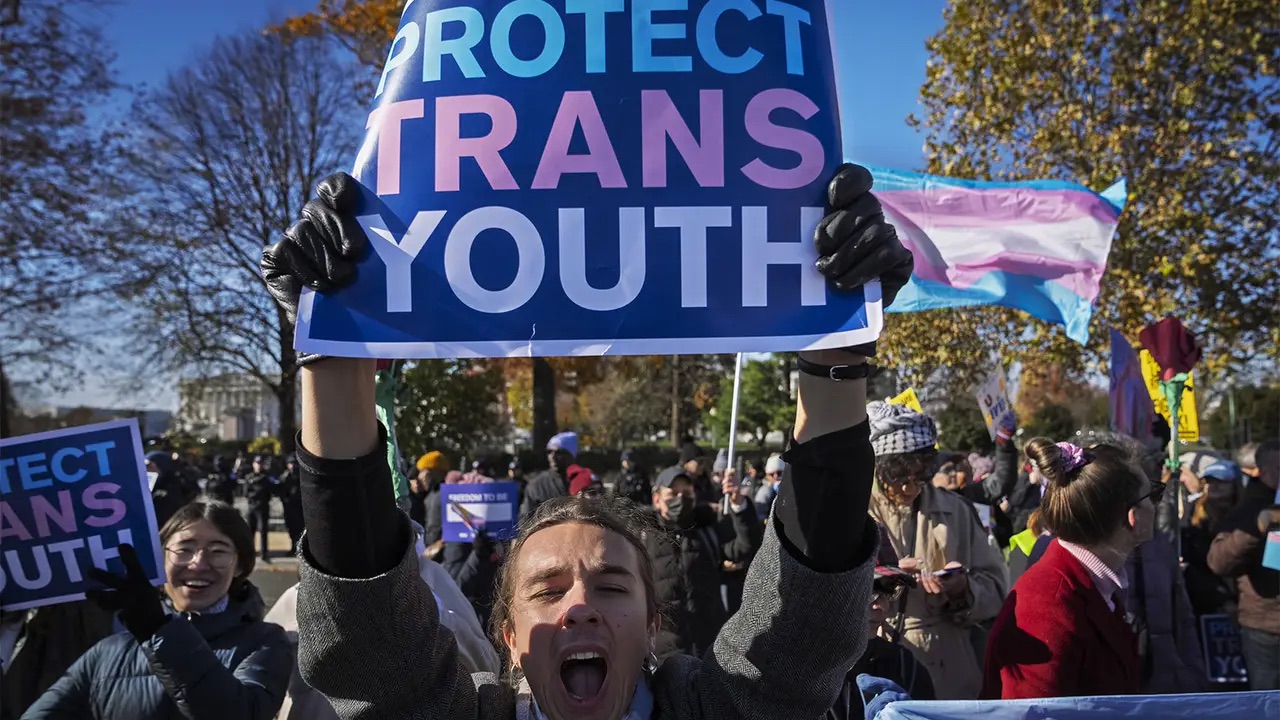By Jenn M. Jackson
June 5, 2025
Last year, during one of the most important elections of our collective lifetimes, many queer and trans activists and organizers sounded the proverbial alarm about the potential consequences if Donald Trump were reelected as President of the United States. Citing the Heritage Foundation’s Project 2025 report, many concerned folks explained that this set of programs, cutbacks, and initiatives would erase terminology pertaining to queer and trans people, decimate support networks that trans people rely on for social and medical services, and criminalize families and providers seeking to assist trans people in gender-affirming care. For many of us, it felt as though we were screaming into an ether where the only responses were, “can he really do that?” and “Project 2025 isn’t even his policy.”
Now, just a few weeks after Donald J. Trump took office for the second time, he has mandated that government agencies only refer to gender in binary “male” and “female” terms, denied gender markers for trans people on their passports, moved trans women into men’s prisons, received the approval of the Supreme Court to ban trans people from the military, defunded gender-affirming care for trans youth, and banned schools from supporting transitioning students. These policy changes fight against what some on the right call “gender ideology” or “transgender ideology” while also placating transphobes committed to erasing the lived experiences of trans and gender nonconforming people. While these policies are meant to target trans people, they are also harmful for teachers, healthcare providers, and school counselors who feel strongly about protecting trans children.
Importantly, Trump’s efforts draw into question whether those in the American public share his vision for the country. While it is no debating that transphobic violence in the United States remains a problem, it is unclear if anti-transgender ideas like those found on Project 2025 are embraced among lay people. According to Pew Research, many Americans may be against anti-trans discrimination yet they may be less likely to support policies like gender-affirming care. These complicated and sometimes contradictory stances on trans rights and protections make this political moment precarious for trans and nonbinary people.
According to data from our GenForward Survey, fielded in June 2018, 53 percent of Black women, 54 percent of Latinas, 60 percent of Asian women, and 54 percent of white women we surveyed strongly favored policies allowing transgender people to continue serving in the military. Conversely, only 37 percent of Black men, 43 percent of Latino men, and 38 percent of white men shared that sentiment. Among men, it was only Asian men who were likely to share the sentiments of women in our study with 58 percent of Asian men strongly in favor of this policy. Overall, men are more conservative than women across all races as it relates to this policy. These data suggest that anti-trans ideas may stem from gender-based heterogeneities within racial groups.
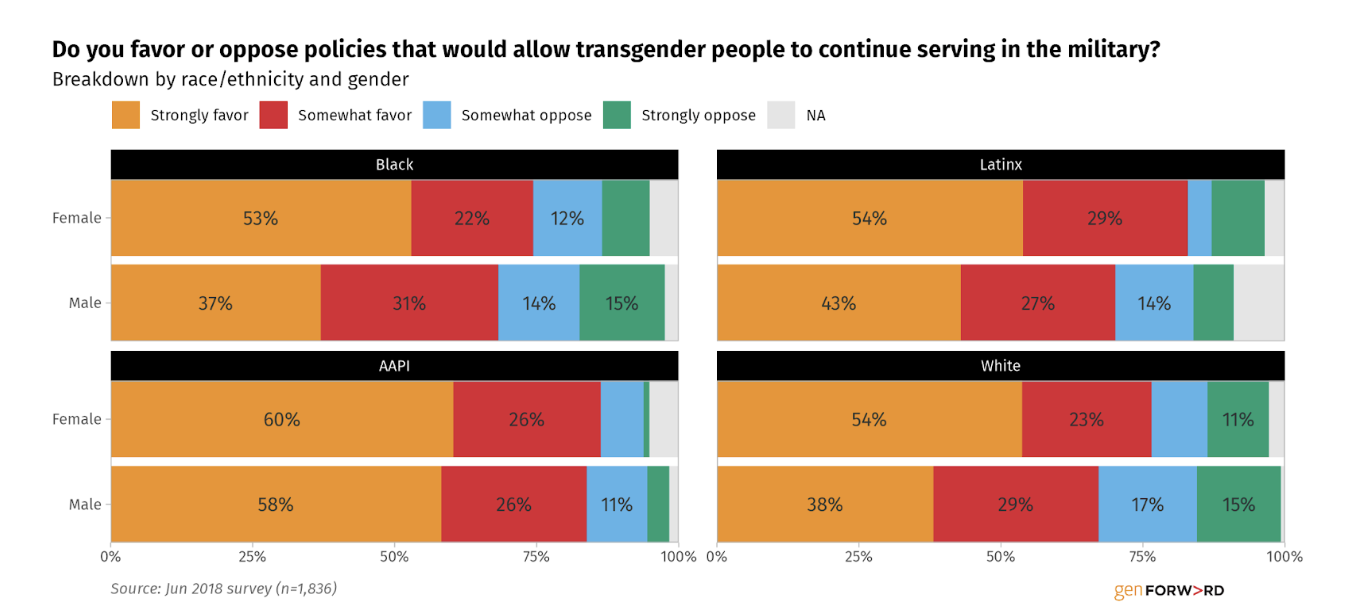
These data also reveal that diverse opinions on trans rights and protections likely stem from diverse personal experiences and characteristics. Another consideration might be geographical location. According to Erin Reed at The Advocate, some of the most harmful anti-trans laws have been passed in the midwest and south. By creating a “legislative risk map” in February 2024, Reed identified one state, Florida, as a “Do Not Travel” state for trans and gender nonconforming people due to strict bathroom bills and driver’s license legislation. Based on this map, states like Utah, Montana, Oklahoma, Kansas, and Tennessee represent the worst anti-trans laws passed in the country. Meanwhile, states like Texas, Iowa, Louisiana, Alabama, Indiana, and South Carolina represent “high risk” states. This means that trans and nonbinary people are actively working to navigate an increasingly hostile nationwide terrain while many still work to form their opinions about protections and anti-discrimination policy.
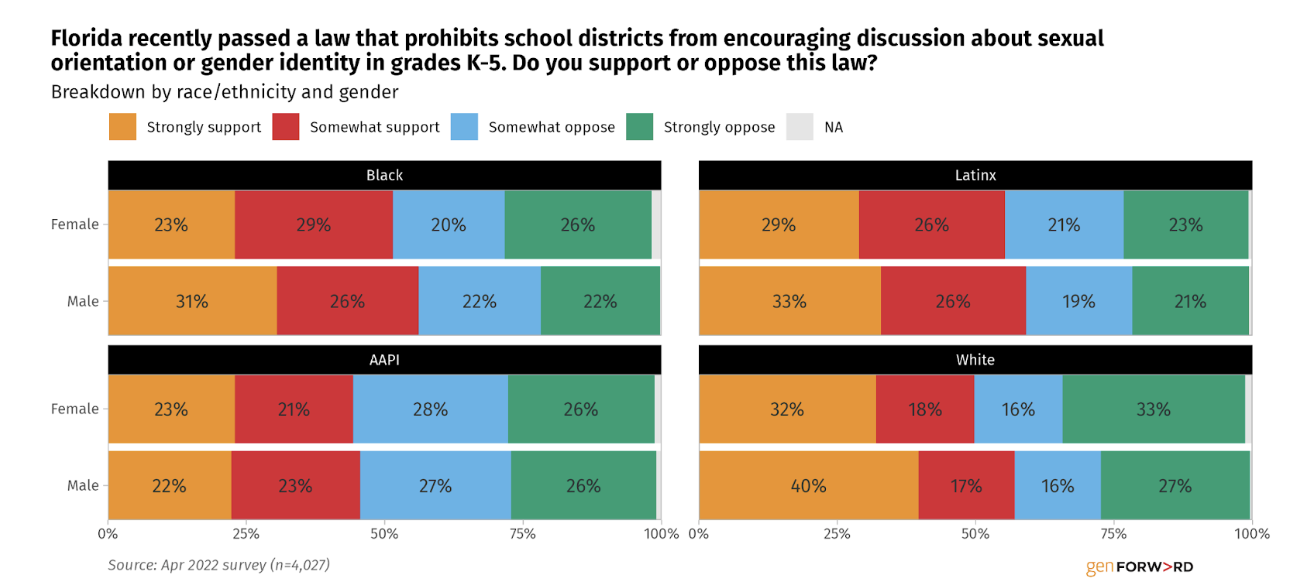
In April 2022, when we asked respondents about a law passed in Florida that prohibited school districts from encouraging discussion about sexual orientation or gender identity in grades K-5, we found that, across every gender and race, there was no clear consensus. Like their stances on trans people serving in the military, Black (31%), Latinx (33%), and white men (40%) strongly supported this law. Comparatively, only 23 percent of Black women, 29 percent of Latinas, and 32 percent of white women also supported this law. Across each racial-gender group respondents were split across their support and opposition for this bill.
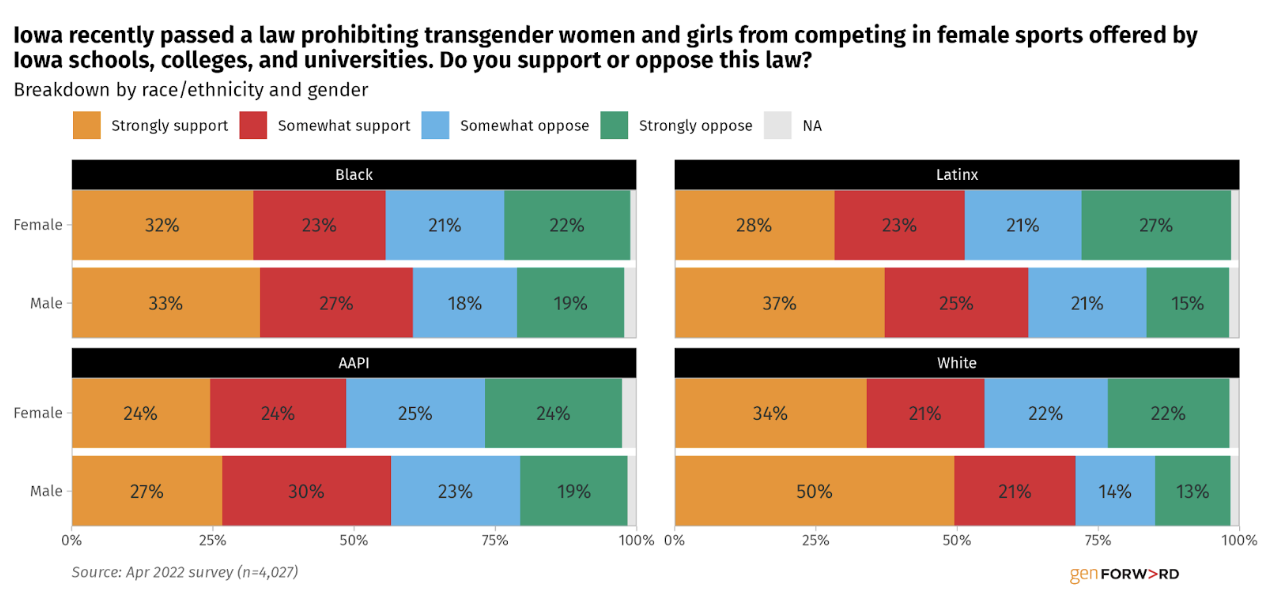
On February 28, Iowa became the first state to officially remove gender identity protections from the state’s civil rights code. This move was foreshadowed by a bill passed several years ago. In 2022, we asked young Americans about Iowa’s law prohibiting trans women and girls from competing in female sports offered by Iowa schools, colleges, and universities. Importantly, 50 percent of young white men strongly supported this law, compared to 34 percent of young white women. There is a similar gap between Latinas (28%) and Latinx men (37%) in terms of strongly supporting this policy. In contrast, young Black men and women were much more closely aligned on this policy with about one-third of each indicating they strongly supported the policy.. Latinas (27%) and Asian women (24%) were the most likely to strongly oppose this law. These data emphasize that opposition and support for anti-trans policies stem not only from racial differences, but also from their interactions with gender.
In one of the most controversial moves regarding gender and identity in the United States, conservative forces have been working to not only eliminate protections for gender affirming care but to criminalize parents, school counselors, and teachers. In April 2022, we asked respondents whether they supported or opposed such a law that was passed in Texas. In a shift from other policies, young Americans largely opposed this policy. Women overall were more likely than men to strongly oppose. Specifically, Black (16%) and Asian (13%) women were the least likely to support this law with only 15% of those who identify as Asian men strongly supporting this law.. These findings suggest that, while young Americans may be conflicted about protections for trans children, they feel strongly that adult advocates for children should be excluded from criminal punishment.
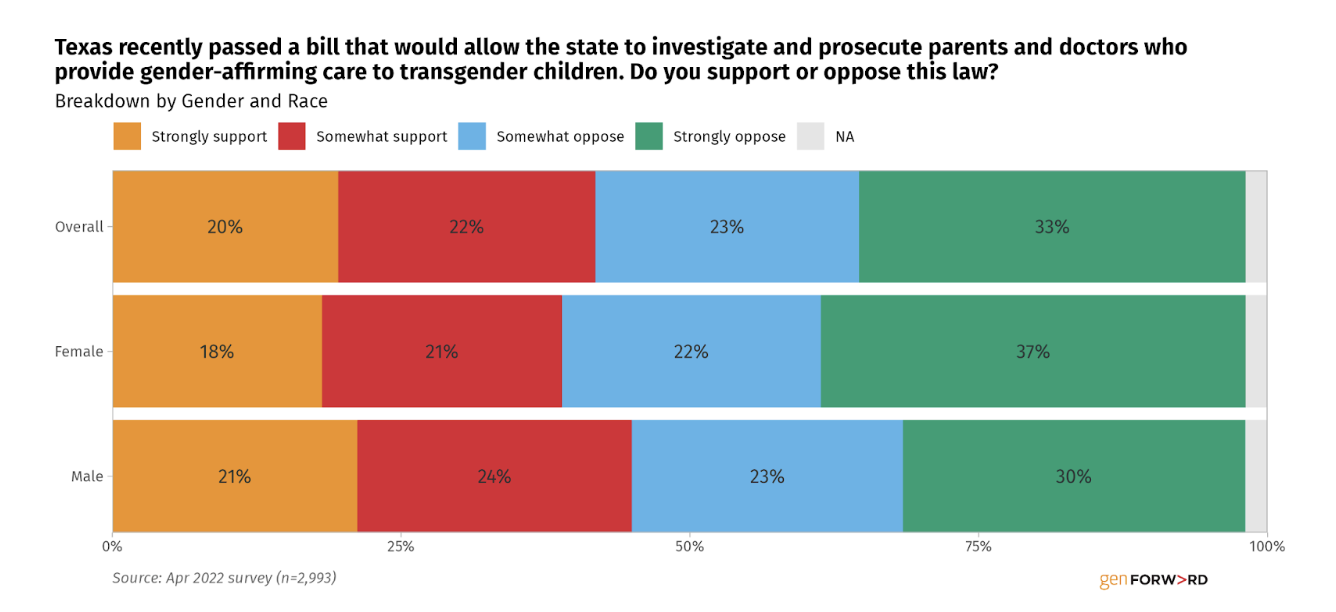
While much is yet to be known about how young Americans feel about trans rights and protections in this political moment, these findings suggest that anti-trans sentiments have long preceded the formal introduction of Project 2025. Across racial and gender groups, young Americans are divided with regards to anti-trans policies and how the future of gender identity should be structured in the United States. These contradictions and incoherences represent a potential site of opportunity for political education and mobilization for movements and organizers. With increased knowledge, these anti-trans initiatives may encounter greater opposition.
One of the most important lessons abolition organizers and activists have taught us over the years is that abolition, like any socially-oriented work, must start with the eradication of the harmful and violent ideas we hold about people who are different from us. But, changing hearts and minds is hard work. It is my hope that, as more people encounter the consequences of Project 2025, more of them will be motivated to shape a more just vision of gender rights rather than acquiesce to someone else’s.
The GenForward Survey is associated with the University of Chicago. The survey was fielded from April 8, 2022 to April 22, 2022, among a nationally-representative sample of 4,143 adults 18+ with oversamples of Black, Latinx and Asian American and Pacific Islander respondents. The overall margin of error is ±2.76 percentage points at the 95 percent confidence level.
Jenn M. Jackson (they/them) is a queer androgynous Black woman, an abolitionist, a lover of all Black people, and an Assistant Professor at Syracuse University in the Department of Political Science. Jackson’s book, Black Women Taught Us, is a critical analysis of why Black women’s women’s freedom fighting has been so overlooked throughout history. Jackson’s research is in Black Politics with a focus on group threat, gender and sexuality, political behavior, and social movements.
More Perspectives


